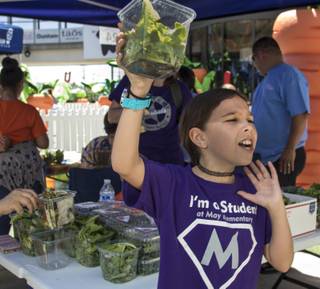
Fourth graders pose for a photo at the Parson’s Patch garden at Parson Elementary School Tuesday, May 2, 2017.
Monday, May 8, 2017 | 2 a.m.
It started when two documentary filmmakers, Ciara Byrne and Kim MacQuarrie, launched Green Our Planet, a crowdfunding platform based in Las Vegas but aimed at supporting projects anywhere in the world — from replanting some of Peru’s native Quena forest in the Andes to installing solar panels on a homeless shelter in Carson City.
It gave rise to the largest school garden program in the country.
“It’s what we call, affectionately, the accidental garden program,” Byrne said.
The seed was Henderson’s Wallin Elementary School in 2013, the same year Green Our Planet helped create the valley’s first student-run farmers market through a partnership with John S. Park Elementary. Gardens have since been planted at more than 100 local elementary, middle and high schools, and on May 4, several dozen schools came together downtown to put on a student-run farmers market.
Set up at Zappos headquarters, students from 33 Clark County schools shared their spring harvest. “They might not eat the carrots from their mom, but they’ll eat them if they grow them,” Byrne said. “Those habits continue into adulthood, so you’re affecting someone’s health their entire life.”
Last year, the nonprofit helped organize 125 markets through the Farmpreneur Program, a learning initiative that teaches fifth-graders the ins and outs of running a business. Some of the schools have expanded their market offerings from raw goods to candles and soaps made from herbs the students have grown.
The gardens drive more than just extracurricular clubs — they’re woven into many schools’ curriculums, meeting both Nevada standards and Next Generation Science Standards laid out by the National Research Council.
“The act of putting the garden in is transforming their environment,” MacQuarrie said. “There’s this natural outgrowth, and farmers markets are a part of that.”
Each grade level has a specific job that is integral to the success of the garden and harvest. Different classes are responsible for ensuring the quality of the soil, monitoring the impact of insects, understanding the nutrition provided by the crops, showcasing how delicious healthy options can be, and more.
“It’s lessons that teachers teach, but it knits the school together, culturally, because everybody has a job,” Byrne said.
Local demand for the gardens and their educational opportunities is so high that 53 schools have inquired about creating their own, with Green Our Planet building an average of one garden per week.
Over the past two years, the mission has expanded to include a thriving chef-to-school program, with more than 60 professional chefs giving demonstrations on cooking nutritious meals featuring the produce grown in school gardens.
Green Our Planet also is collaborating with other nonprofits and corporate sponsors to weave advanced techniques into the curriculum, including hydroponics and pollinator gardens. Los Vaqueros, which creates portable hydroponic units, partnered with Green Our Planet in 2016 to launch the first citywide hydroponics-supplied salad bar in the school district. Students are trained to maintain the systems — provided free to any school within the network — and turn their produce into power fuel for their peers.
The nonprofit also partnered with Southern Nevada Milkweed Project to launch a monarch butterfly/pollinator program last year. Due to monarch populations declining over the past 20 years across the U.S., scientists have discovered that by planting their native food, local milkweed, the insect’s numbers increase. Green Our Planet offers schools pollinator gardens that are planted with native milkweed and other natural attractors of beneficial insects.
Each of the programs reinforces the concepts taught in the classroom by allowing students to practice what they’re learning in real life.
“You could learn auto mechanics reading a book, but if you never have the garage and you never go out and tinker, it’ll go in one ear and out the other,” MacQuarrie said. “It’s applying all those standards and physically doing them — kids retain a lot more information.”
While schools use Green Our Planet as a fundraising platform with a streamlined process, the financial model includes partnering with a corporate sponsor such as Zappos or Switch to offset the cost of supplies and gardening pros needed to turn each school’s vision into a blooming reality.
Nevada has consistently ranked last or near the bottom in terms of public education metrics, but the impacts of school gardens may play a part in changing that.
MacQuarrie said countless studies show that in places where school gardens are used in teaching STEM (science, technology, engineering and math), educational opportunities improved.
“It’s transforming kids through experiences instead of just sitting in a classroom,” Byrne said. “They’re just not given the opportunities, but when they are, they rise to the occasion.”



Join the Discussion:
Check this out for a full explanation of our conversion to the LiveFyre commenting system and instructions on how to sign up for an account.
Full comments policy